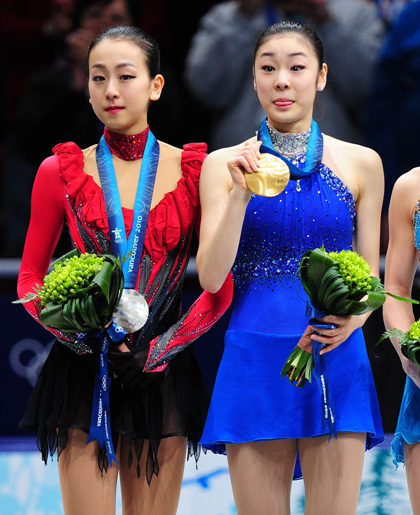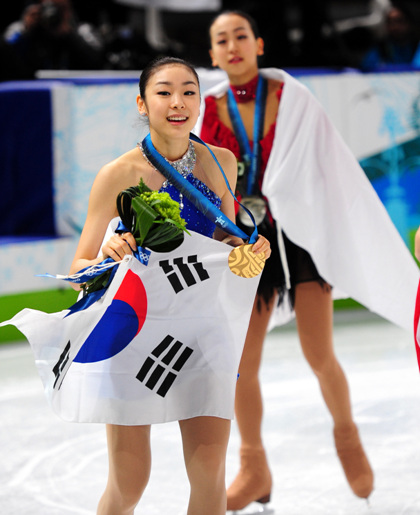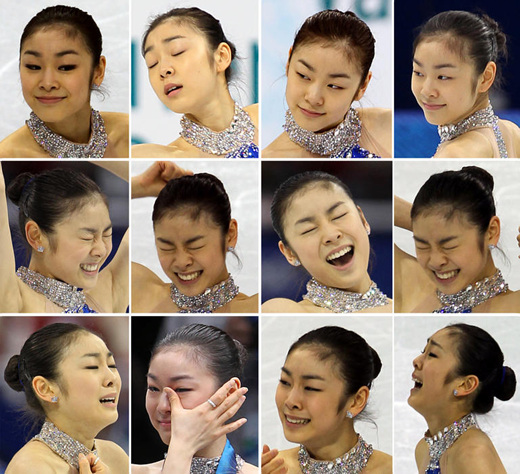Yu-Na Kim a living, breathing work of art from Korea
Figure skater is coached by Canadian Brian Orser
As for the gold, no contest. No argument.
Yu-Na Kim, Brian Orser's ethereal 19-year-old living, breathing work of art from Korea, is almost literally in a different league from everyone else in women's figure skating.
“I thought 140 would be a great score and she did 150 – wow,” said Orser, the Canadian silver medalist from the Calgary Olympics who agreed to coach Kim at the Toronto Cricket Club in 2007 and added the polish to Kim's artistry, solidified her jumps and, with David Wilson's choreography, brought out the almost regal presence and flirtatious physical expression that leaves judges spellbound and the rest of the field distantly in her wake.
Through two programs at these Olympic Games, Kim was immaculate, and the prohibitive favourite coming in never left an opening for her pursuers. Her winning margin was more than 23 points.
They might as well have invoked the mercy rule after she skated.
"I can't believe it – I did my performances very clean. I guessed a 130 or a 140 but I'm very surprised,” said a tearful Kim, who is usually dry-eyed after a performance but was unable to hold back once she had finished her free skate Thursday night at Pacific Coliseum.
“I don't know why I cried. This is the first time.”
Japan's Mao Asada landed two clean triple Axels, the second one in combination with a double toe loop – and wasn't even in the neighborhood of Kim's winning score of 228.56, a total no one else is likely to touch for quite some time. Unless it's Kim herself.
“She'd have been ninth in the men's competition with that score,” said Skate Canada's high performance director Mike Slipchuk. “I knew halfway through her skate that she was untouchable.”
Said 1992 Olympic gold medalist Kristi Yamaguchi: “She's taken women's skating to a new level.”
The second half of Asada's performance, which had started with her two big tricks, unravelled a bit, and she barely outdid Canada's Joannie Rochette in the long-program, by 0.44 points.
Rochette wasn't at her best, either, but started the night with a healthy lead over fourth-placed Miki Ando of Japan, and widened it to clinch the bronze medal – dry-eyed, this time, until leaving the stage. It was a considerable show of composure, grit and courage by the 24-year-old from Ile-Dupas, Que., whose mother died in Vancouver two days before her short program Tuesday.
Who says figure skating judges have no hearts?
But they also have eyes, and Kim's superiority was right there for all to see. She landed six triple jumps, three of them in combinations, but more than the tricks themselves was the bigger picture she painted, skating to Gershwin's Concerto in G.
American 16-year-old Mirai Nagasu, skating last in the final group, gave the U.S. a glimpse of the future with a terrific skate to edge Ando for fourth.
"Knowing that I had to skate last in the Olympics was added pressure. I think I did well despite the pressure and skating after Joannie,” said Nagasu. “I think she skated for the love of everything, her mom and the love of skating. If ever I'm in a tough spot I can look to her. She has become a role model for all young girls."
Orser has been steadfast that a gold medal for Kim would not represent vindication for him. He won both the short and long programs in 1984 in Sarajevo, but was unable to catch American Scott Hamilton because of the weight given to compulsory figures at the time.
Four years later, he skated brilliantly but lost the gold on a 5-4 judges' split to another American, Brian Boitano, in Calgary.
“It's not my gold, it's hers,” said Orser, who's won a world title with Kim, been inducted into the ISU's world skating hall of fame and now been part of an Olympic gold, all in the last 11 months.
“She was a little bit nervous at the start, but I didn't mind that,” said Orser, who looks like the ultimate bundle of nerves outside the boards, dipping and jumping and emoting throughout the program, as though he can will the skater to do each movement.
“She didn't miss a step, from what I could see from my side. She was skating with her heart. I just wanted her to have an Olympic moment. I wanted it to be Olympic and not cautious, not hold back, just go out and embrace the space, and the Olympic Games.”
She did. And the Olympics embraced her right back.
[email protected]







































































